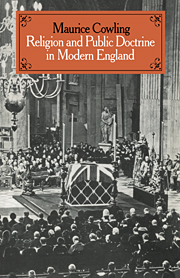3 - Three Anglican Reactionaries
Published online by Cambridge University Press: 08 March 2010
Summary
‘ “You are a Liberal” I persisted.
A shade of annoyance passed over his face.
“No. I am not a Liberal” he said. “A Liberal is a person who believes that the great thing is kindness and that all religions have a lot of good in them … I can't tell you how much I don't believe in that.” ’
Christopher Hollis Fossett's Memory 1944 p. 128.‘He had far too deep a heart to be a Humanitarian and far too free a mind to be a Liberal.’
Kenneth Pickthorn on Rev. Sir E. C. Hoskyns in Sir E. C. Hoskyns Cambridge Sermons 1938 p. xxiv.‘The claim that wisdom is a Christian virtue grounded upon Christian faith and worship – and upon Christian theology – is now scarcely ever seriously considered, and men and women are brought up in an environment in which truth is a priori assumed to be discoverable most surely by those who have discarded the discipline of the Church. Dislike of the clergy, even by the clergy themselves, and the desire to appear as laymen, are often the concrete signs of this subtle revolt against the ecclesiastical foundation of wisdom.’
Rev. Sir E. C. Hoskyns Studying the Bible in We are the Pharisees, A Course of Sermons entitled ‘Contemporary Judaism’ (delivered in 1935) 1960 p. 70.Church–State Anglicanism in the forms in which it will be described in this chapter was a protest against the intellectual assumptions dominant amongst the thinking classes in early-twentieth-century England.
- Type
- Chapter
- Information
- Religion and Public Doctrine in Modern England , pp. 47 - 96Publisher: Cambridge University PressPrint publication year: 1980



